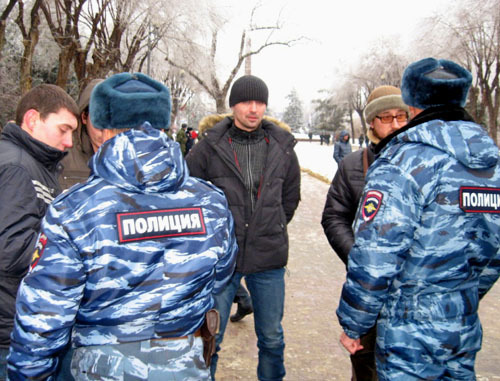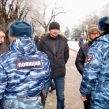
Nationalist Reaction to Volgograd Bombings
Publication: Eurasia Daily Monitor Volume: 11 Issue: 9
By:

In the wake of the late-December 2013 double bombings in Volgograd (see EDM, January 6), the attention of most analysts has rightly been on the threat posed to the Sochi Winter Olympics by the Caucasus Emirate and its leader Doku Umarov’s pledge to disrupt the Games. However, the attacks also revealed another potential source of disruption to a peaceful Olympics. In the aftermath of the first bombing, nationalist groups on December 30, led by the group Russian Regions, called for a “skhod” (“people’s gathering,” or a mass street demonstration) to demand the resignation of the “governor and the mayor of the city.” One of the far-right groups involved in the protests was Sputnik and Pogrom (https://lenta.ru/news/2013/12/29/sxod/). The call for a skhod, coordinated via the social networking site VKontakte, attracted more than 50,000 signatories. The regional authorities were quick to maintain public order by arresting 30 of the 70 people who turned up for the meeting (https://vk.com/video-14499060_167051222?list=91ec9e460773778c40).
Although nothing happened at this particular public protest in Volgograd, the call for nationalist mobilization does highlight the threat posed by nationalist reaction to any further terrorist acts. The planned skhod in Volgograd was paralleled by another sympathy event in Moscow where the “Russkie” organization of ethnic-Russian nationalists planned to lay flowers in remembrance of those who died in the bombing (https://rusnat.com/2013/12/30/russkie-yuga-moskvy-pochtut-pamyat-pogibshix-v-volgograde/). Although of course a laudable sentiment, the particular ethnic coloring of such an event serves the purpose of “consciousness-raising” on behalf of the ethnic-Russian majority. Such events also have a propensity to turn violent quickly. The country-wide scope of the sympathy movements illustrates the extent to which the ethnic-Russian movement is likewise national in scope.
Nationalist pogroms against people from the Caucasus (but sometimes taking in all dark-skinned foreigners as well) have become a frequent occurrence in Russia over the last eight years. Beginning in 2006, the nationalists scored their first major success in “consciousness-raising” among ethnic Russians by carrying out a pogrom against Chechens in the Karelian town of Kondopoga following an incident of deadly Chechen-Russian violence there. Consequently, the phenomenon of the skhod by nationalist demonstrators followed by inter-ethnic violence has become a regular feature of contemporary Russian politics. The year 2007 saw such a gathering in Stavropol as well as a riot following the alleged murder of an ethnic Russian by Chechen migrants. And 2010 witnessed the infamous large gathering in Moscow of some 5,000 people on Manezh Square following the death of ethnic-Russian Yegor Svidorov. Likewise, the 2013 pogroms in both Pugachev (https://jamestownfoundation.blogspot.com/2013/07/pugachyov-and-kondopoga-technology.html) and Biryulyevo (see EDM, October 21, 2013) were triggered by similar events that themselves initially generated their own skhods.
Russian nationalists have already expressed displeasure about the upcoming Sochi Winter Olympic Games, especially the astronomical costs. The now-banned Movement Against Illegal Immigration (DPNI—the organization currently exists solely as a website in Russia) railed against the vast expenditures and corruption at the Games and have links to mass media articles highlighting such instances on their website (dpni.org). Dmitry Demushkin, spokesman for the Russkii “ethno-political” organization and onetime leader of the now-banned skinhead gang Slavyansky Soyuz, argued in the wake of the bombings that the regime was merely concerned about protecting its own prestige while ordinary Russians are paying the costs. This populist message has worrying implications for the regime (https://rusnat.com/2013/12/30/d-dyomushkin-vlast-oxranyaet-svoj-prestizh-i-olimpiadu-v-sochi-kuda-effektivnee-chem-svoix-grazhdan/).
Similarly, the organization Sputnik and Pogrom linked the perceived financial recipient status of the North Caucasus region with Kremlin policy and state integrity, noting in an article on its website that the policy of “if we give the Caucasus billions, things will quiet down” has failed. The article goes on to conclude that the time has come to recognize that the North Caucasus is part of a different, Islamic, world now that “Wahhabism” has overtaken traditional Russian Islam (https://sputnikipogrom.com/politics/7819/volgograd-whats-next/). It is the perception of Russia as a country “under siege” from Islamists that could do the most danger to the integrity of the Russian Federation (see EDM, January 7). Even moves seen in the West as attempts to improve Russia’s international image in advance of the Sochi Winter Olympics—such as the amnesty given to, amongst others, former Yukos CEO Mikhail Khordokovsky—have produced a backlash in the nationalist community due to Khordokovsky’s Jewish heritage (https://www.stormfront.org/forum/t1013179/). In such a polarized environment, the Olympic Games have an even greater potential to produce problems for the country.
The two issues of corruption and ethno-nationalism are linked symbolically (if not logically) in the minds of ethnic Russian nationalists and the skhod planned to take place in Volgograd was reportedly endorsed by both the opposition party Yabloko and anti-corruption blogger Alexei Navalny’s RPR-PARNAS party (https://rusnat.com/2013/12/30/v-volgograde-sostoyalsya-narodnyj-sxod-pamyati-zhertv-terakta/). In order to forestall potentially embarrassing events for the Russian government, the authorities have prepared to carry out crackdowns on protests in Sochi. Yet, this ban on public protests is, in itself, a source of consternation for the nationalists (https://www.newsru.com/russia/07jan2014/so4i.html). Moreover, it is far from certain that the state will be able to contain spontaneous public demonstrations across Russia, especially in the aftermath of a large-scale terrorist attack when the government’s resources will be devoted elsewhere.
Further attacks are almost certain. Illustratively, on January 9, the government declared a counter-terrorism operation after a series of shootings and car bombs in Stavropol left five dead (https://itar-tass.com/proisshestviya/877788). The possibility of an explosive nationalist protest to this or any other perceived event, therefore, should be an issue of concern to analysts interested in security at the Sochi 2014 Winter Olympics.




